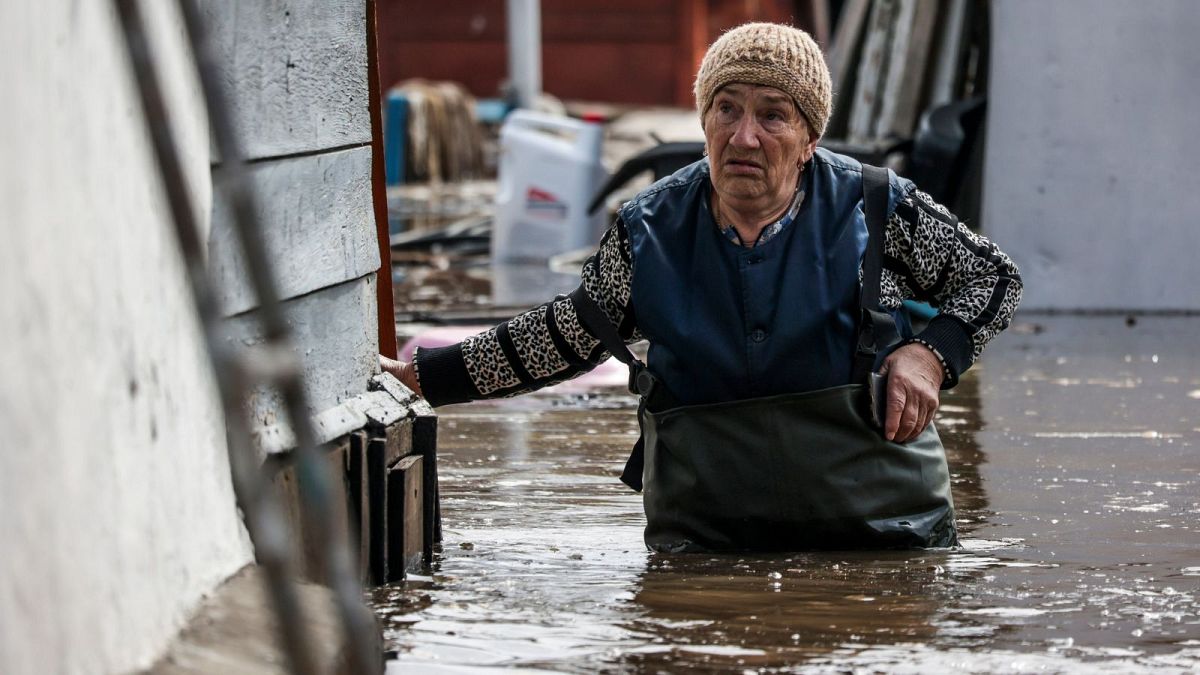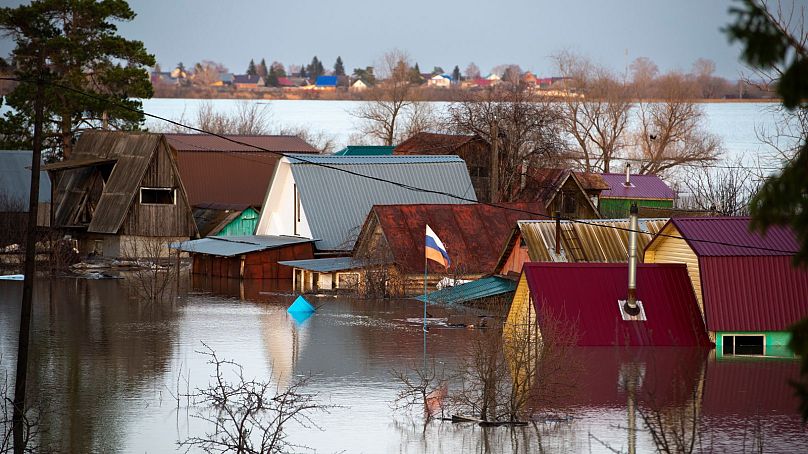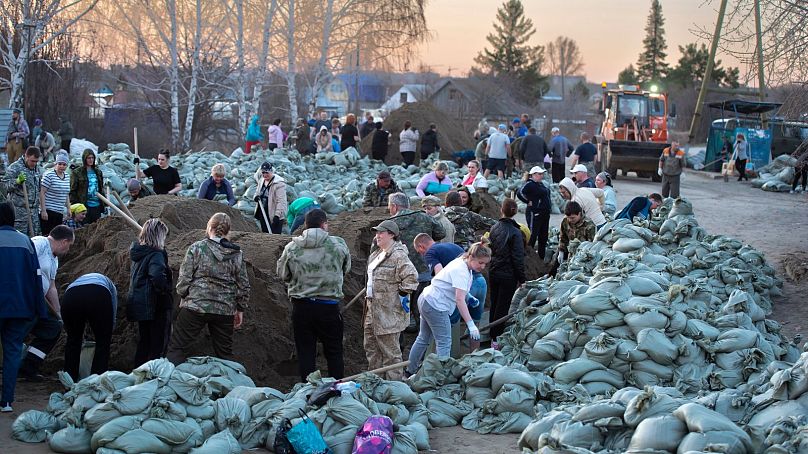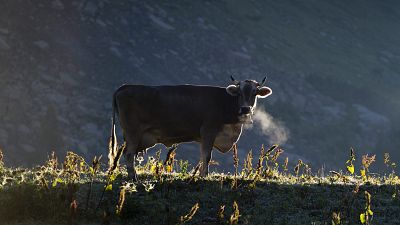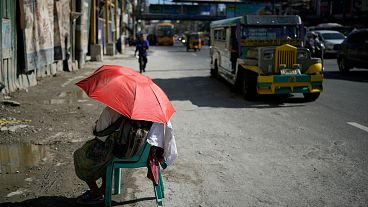Mass floods in Russia have thrown a spotlight on the country’s approach to managing the increasing risks it faces from climate change.
On 9 April, days after a dam burst caused disastrous flooding in southern Russia, Yulia Navalnya blasted the government’s handling of the crisis on X.
“The authorities in our country never seem to be prepared for anything,” the widow of Russian opposition leader Alexei Navalny wrote in a damning thread. “In winter, they are unprepared for frost and snowstorms, in summer - for fires, and in spring - for floods.”
Spring flooding is typical across the Ural region, as the Ural River - Europe’s third longest - fills with snowmelt from the Ural mountains. But the river hit record levels this April when unusually high snowfall melted rapidly after a jump in temperature, from 0 to 20C within days.
On route from the mountains to the river’s mouth in the Caspian Sea, the southern region of Orenburg has borne the brunt of flooding, along with northern Kazakhstan. The Ural burst through embankment dams in the city of Orsk on 5 April and flooded parts of Orenburg city.
As of 22 April, rivers had receded but flooding still plagued thousands of people in central Russia, the AP news agency reported, with around 18,000 evacuated from the Kurgan and Tyumen regions too.
Russia’s flood management prompted a rare protest in Orsk. And, in their wake, the waters have raised important questions about how prepared the country is for climate change - and why.
How vulnerable is Russia to climate change?
By far the world’s biggest country, Russia faces various challenges on a heating planet. Climate change is behind a rise in extreme events, from fiercer forest fires in Siberia to more frequent flooding from its Arctic rivers.
Professor Arild Moe, an expert in Russian energy and climate policies based at the Fridtjof Nansen Institute (FNI) in Norway, says there has always been an “ambiguity” in the Russian understanding of climate change.
On the positive side, Russia foresees better navigational opportunities in the Arctic Ocean, as well as more agricultural land and reduced heating needs.
“But if you look at this over time, the negative aspects have become more pronounced [in official documents],” he says.
As Moe highlighted in a 2022 article, Russian climate policy has - in contrast to the West - focused on adapting to climate change rather than mitigating it by cutting emissions.
Pollution-wise, Russia remains “extremely unambitious” as it fortifies its fossil fuel economy. Its broad definition of ‘adaptation’ includes adjusting to the rest of the world’s energy transition.
What is Russia’s approach to climate adaptation?
There has been a more serious focus on adaptation measures in the last several years, Moe says, but through a bureaucratic lens. The federation is working on a “conceptual framework” for concrete measures to reduce risks - but the concrete measures themselves are hard to spot.
Flooding is notably absent in a climate adaptation document produced for the Orenburg oblast, seen by Moe. The assessment focuses on temperature risk and the associated possibility of disease, as well as drought; “there is nothing about the risk of floods there,” he says.
However, he points out, “we must not put ourselves on a high horse regarding preparations for climate change.” These preparations are not only a Russian problem, he says, but have been lacking across Europe.
In Moe’s own country, Norway, for example, he says the impact of unprecedented floods last year was made worse by authorities allowing construction close to rivers.
“Taking climate risk into consideration is a big challenge,” he says, “because it means that you are saying no to some interesting economic prospects because of problems that perhaps may occur. And that is also the case in Russia; precautionary measures collide with the immediate economic benefits.”
“So Russia doesn't differ that much,” he adds. “What you don't have in Russia is more fundamental discussions about the development of the economy in relation to emissions.”
As Navalnya put it on X, “Disasters happen in every country. The question is how to deal with them.
“Our officials are busy whitewashing themselves and blaming the victims. Until people take to the streets in protests, no one even planned to meet with them.”
How did Russia respond to the floods?
“It was such a terrible, nerve-wracking situation because the water kept rising and rising,” Veronika, an Orenburg resident, told The Moscow Times.
At its peak, the Dutch-based news site reports that floods submerged almost 18,000 homes in 210 Russian towns and cities, with the Orenburg and Kurgan regions hardest hit. At least seven people died in the Orenburg region, according to investigative outlet IStories.
There have been mixed reports from Russia about how well the crisis was handled and communicated to people.
Navalnya’s X thread claims that residents in Orsk were not forewarned that they should evacuate, in contradiction to the head of the Emergencies Ministry’s account.
On 8 April, hundreds of Orsk citizens protested in front of the city’s administrative building to demand compensation for the flood damage. Orenburg governor Denis Pasler subsequently promised payouts of around €100 (10,000 rubles a month) for six months to displaced people.
In many areas, flood fighting was a joint official and voluntary effort. Some villagers defied advice to flee their homes and constructed homemade dams, under threat of fines.
More could have been done to mitigate the disaster in the first place, Vladimir Slivyak, co-chairman of the Russian environmental group Ecodefense, tells Euronews Green.
“The inspection of dams could be strengthened and the destruction of many could be avoided,” he says. “There could be a new governmental agency established, dealing with [dangers] arising from climate change.
“The regime of Vladimir Putin was actually doing something opposite in Russia.”
Was climate change behind the floods in Russia?
It takes time to determine the exact role of climate change in particular extreme events. But scientists say the crisis is causing heavier snowfall in the north and east of the region - leading to larger spring flooding when the snows melt.
"We're looking at a seven per cent increase in [snow] precipitation where there is one degree temperature change,” Maria Shahgedanova, a professor of climatic science at Reading University, told Reuters.
Moist soil going into winter, higher-than-usual snowfall and a sudden temperature rise at the start of spring created the perfect storm of conditions for mass flooding.
"Within days temperatures went from zero to 17, 18 and even 20 degrees [Celsius]. And that's what caused a very, very rapid snowmelt," Shahgedanova explained.
Why is Russia not more prepared for climate disasters?
“There are no realistic plans for climate change adaptation in Russia,” Slivyak says. “[The] government just doesn't see it as a priority and real climate science is not part of the governmental view.”
Warnings from Russian scientists and environmentalists have fallen on deaf ears, he claims, as the government focused on a different agenda: maximising fossil fuel exports, and spreading Russian geo-political influence. “Climate change just doesn't fit into this set of priorities.”
Russia’s full-scale invasion of Ukraine in February 2022 shifted priorities again.
“Climate change was never very high, but it seemed to be creeping up [the agenda] after 2019,” says Professor Moe. “Now everything is about the war.”
Though climate change has been pushed aside, he adds that bureaucratic processes around adaptation - such as devising cost-benefit analyses for certain policies - continue.
Russia’s leading climate scientists and most vociferous campaigners now find their work much altered or impossible.
“Civil society have done a lot of efforts to warn [the] Russian population about climate change and adaptation. But then the regime of Vladimir Putin started to put so much pressure on civil society groups that they could not work in Russia anymore,” says Slivyak.
“And when it comes to information coming out of government and linked to it big business, there were all kinds of alternative theories promoted. From one about that climate change is a conspiracy of the West to prevent Russia getting rich from exporting fossil fuels, to another one about climate change is something natural and people can't do anything about it.
“All such theories are ignoring science and aimed at giving an excuse for the president and government to not do anything about climate change, and avoid spending money on adaptation to it.
“Well, now Russians are paying [a] big price for the actions of their government and president.”
